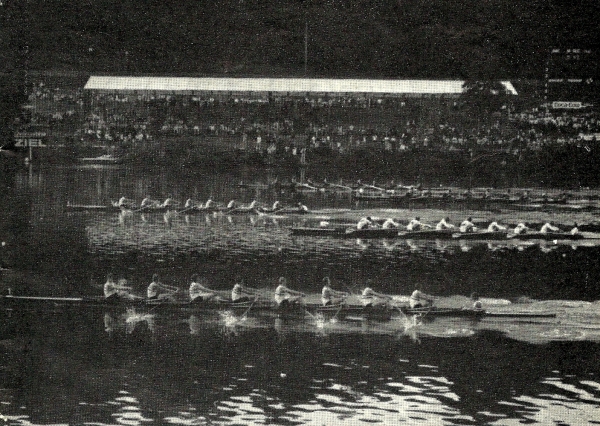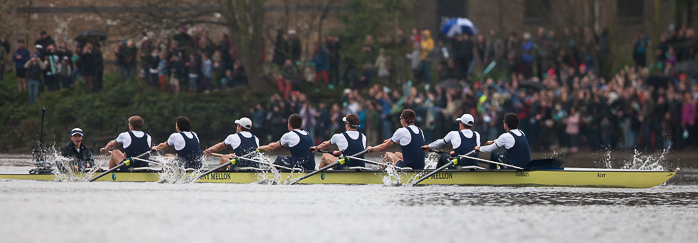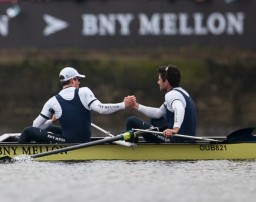Lucerne, 11 July 2014 | Christopher Dodd
Lost in reminiscences — the historical guru of rowing journalism takes us back 40 years to the early days of international championships on the famous ‘Lake of the Gods’
 Watching the rain fall on the Rotsee at Lucerne’s final round of the World Cup 2014, I recall my first visit here forty years ago. The occasion was the 1974 World Championships, which turned out to be a riveting face-off in the sporting rivalry between the two sides of the Iron Curtain and – although we didn’t realise it at the time – the seminal moment in the return of Britain to the medal podium after years in the Doldrums.
Watching the rain fall on the Rotsee at Lucerne’s final round of the World Cup 2014, I recall my first visit here forty years ago. The occasion was the 1974 World Championships, which turned out to be a riveting face-off in the sporting rivalry between the two sides of the Iron Curtain and – although we didn’t realise it at the time – the seminal moment in the return of Britain to the medal podium after years in the Doldrums.
It was 11 pm on a black Tuesday night and raining cats and dogs as Jim Railton and I were dropped at the door of the Montana. We correspondents of the Times and the Guardian respectively, had a bargain package holiday at this starred hotel, perched on a steep hillside above the Vierwaldstättersee. Before checking in, we were pleasantly surprised to find a cold collation laid for us in Henrietta’s bar, where huge arched windows looked across lake and mountains when weather permitted, and whose reputation as a classy watering hole extended through western Europe.
Things began as they were to continue. The Irish team management arrived at midnight when our hostess Henrietta, stylishly groomed and gracious cocktail shaker, lowered the lights, set up a record player behind the bar and cajoled her drinking friends to dance. Soon Swiss couples were jiving, albeit self-consciously, Jim was at the piano and a couple of policemen, a dentist and a barrister-at-law were in fine voice rendering Gaelic and republican songs.
As the sky faintly lightened it gradually became apparent that the windows looked over a sheer drop. Henrietta chose this moment to perform her party trick. She pushed up both sash windows and stepped out of one into the abyss. Then she reappeared through the other window, having swung herself from one to the other on the rope that controlled the window shades.
Soon Jim and I were dissuading barrister Donal Hamilton, God rest his soul, from having a go himself. I learned later that Henrietta once missed her hold and broke a limb.
It was 6 am when I saw my room for the first time. Sun was breaking through the cloud lighting snow on the peaks across the lake. The women’s finals began at 10 am later that morning. Welcome to Lucerne.
Man falls off trolley
Two battles were raging in international rowing in the 1970s. One was the struggle for gold medals between the DDR (East Germany) and the Soviet Union. The other was attempts to get amongst the medals by ‘Western’ nations. One such came from Britain in the men’s eights. Head coach Bob Janousek formed a crew by invitation only in October 1973 to mount an assault on the Montreal Olympics three years hence. Lucerne 1974 was its first championship event, and it was well placed to qualify for the final until disaster struck in the semi-final.
The boat was moving smoothly into second place after 500 metres when cox Pat Sweeney sensed something was not quite right. Hugh Matheson in the 5 seat watched in horror as the wheel nut on the seat in front worked itself loose.
About five strokes after the nut came off, Tim Crooks drove in a catch but flew off his seat onto the runners. He pulled his oar in across the boat. The seat was twisted at a crazy angle and held rigidly by the alloy hooks underneath.
He remembers hearing someone shouting ‘Stop! Stop! Tim’s slide’s gone’.
But they didn’t stop.
‘I thumped the seat and got it under my arse, but it was scraping terribly. I got back on and we soon got back to full speed. The whole thing probably took about ten seconds, but of course for me it was in slow motion.’
Cox Sweeney calmly called for a long push to the finish line. ‘During this time, the boat never dropped its rhythm, never fell off balance,’ he says. ‘We dropped from second to last and we had about 800m to go.’
The British crew clocked the fastest final quarter (1:27.80 – and remember, this is 40 years ago in completely different equipment) and finished third, secure for the final.
Crackle and gust
 The Rotsee is a deep green finger lake hidden at the back of the town by steep wooded banks. It gets its name from the reddish weed that grows in it. The water is usually flat, although Lucerne is prone to zigzag lightning, crackling thunder and sudden gusts. Cows graze near the lake. Wal Yallop of the 1974 British eight told me: ‘If I was rowing all right I could hear the cowbells, if I was too stressed I wouldn’t hear them.’ He didn’t hear them during that semi-final.
The Rotsee is a deep green finger lake hidden at the back of the town by steep wooded banks. It gets its name from the reddish weed that grows in it. The water is usually flat, although Lucerne is prone to zigzag lightning, crackling thunder and sudden gusts. Cows graze near the lake. Wal Yallop of the 1974 British eight told me: ‘If I was rowing all right I could hear the cowbells, if I was too stressed I wouldn’t hear them.’ He didn’t hear them during that semi-final.
The town of Lucerne is overseen by the brooding peak of Pilatus that plays hide and seek behind billowing clouds. The place has hardly changed in 40 years. It hoards tourists. It has towers and belfries, pointy roofs and dormers; turrets and ramparts; bridges decorated by old masters, walls graffiti’d in the middle ages; conical spires and shutters; bells and bell towers; balconies and banners, fountains and flowers; steep alleys and quiet corners; paddle steamers and trolleys; the icy draught of the rolling Reuss river, and the tall story factory at the Pickwick pub.
It has museums for Wagner and transport and Picasso; a glacier garden and the Lion of Lucerne hewn into rock; art museums and a stunning concert hall, and a great panorama depicts the rout of the French at the hands of the Prussians;
But vanished are the jazz music shop, the antiquarian bookstore, the old map shop, the English bookstore and the proper junk shops that I used to know. Overpriced designer labels, under-priced clothing outlets, Swatch shops, shoe and furniture emporiums and tourist tat have swamped them all.
In 1974, the weather gods unleashed their full portfolio on this stunning theatre. Chatting over coffee with Canadian coach Al Morrow in Hudson’s tent while the gods watered the Rotsee in 2014, I find that 1974 was also Al’s first visit to Lucerne. He was rowing in a four that finished eighth, Canada’s best result in that period. The memories flood back. Ireland’s great hope was the sculler Sean Drea who was taken ill on the first day and was whisked to hospital. He was allowed out only to race and was door-stopped day and night by David Faiers who wrote reams of will-he-won’t-he-and-what’s-really-wrong stories for the Irish Independent. Drea didn’t fulfil hopes on that occasion.
Lucerne 1974 was not one of prestigious Leander’s best moments, either. The Henley club enjoyed the sponsorship of Pimm’s who arranged a reception in Henrietta’s bar at the Montana, where else? As a resident I gatecrashed it, taking my friend Rolf, a wild-looking philosopher who drove the Dutch bus-cum-boat transport and went everywhere in bare feet. This practice caused a major talks with the hotel management. Meanwhile a drunken be-blazered Leander heavy ricketed through a glass door, smashing it and a glass table, if I recall correctly.
‘Now the East, give me ten…’
There were jitters aboard the British Karlisch shell before the final of men’s eights, after the drama of the semi. ‘As usual, we were dumped at the start, but we were clean and hit a good rhythm’ says cox Sweeney. They were last at 500 metres, but a burn after 750 metres took them through West Germany. Tim Crooks was totally focussed, and Wal was hearing cow bells.
‘Sweeney started talking us through the crews,’ Matheson says. ‘It was a splendid sensation because he’d say, Now we’re going to get the Russians, give me ten… Now we’re going etc. He talked us through the field until only the Americans were left.’
Mike Vespoli, the future boat builder who was on board the American eight, says that ‘the British were sort of lying in wait. Well, from our position in the boat, there was not a way in hell they were going to catch us.’
‘Coming through the 1500 mark,’ Sweeney says, ‘we were moving past the East and closing on the Russians. With 300 metres to go we had taken Russia. There was just the US and NZ left. I wasn’t thinking medals, just racing to win. I was pretty sure we had New Zealand with 200 metres to go, and we were still closing on the US, but we ran out of course.’
They had beaten the East Germans and the Soviet Union, pipped the New Zealanders and closed on the Americans. It was a sensational result, not only for Bob Janousek’s men, but also for Al Rosenberg’s Americans and Rusty Robertson’s Kiwis. American oarsman Al Shealy summarised the achievement as one that dreams are made of. ‘The greasiness of that boat, combined with the almost absolute symmetry of body movement within the crew, made for an unforgettable experience.’
From the press stand watching six eights closely bunched was as thrilling as it was seismic. The Americans, British and Kiwis had kept East Germany and the Soviet Union out of the medals in the premier event.
Of six women’s gold medals, four went to East Germany and one each to USSR and Romania. Eastern bloc countries won fifteen of the 18 medals, and 15 of the available 24 men’s open medals went to the eastern bloc. East Germany won six of the golds and the USSR the seventh. The West Germans had two bronzes. In the double sculls, Alf and Frank Hansen of Norway won silver and Chris Baillieu and Mike Hart of Britain bronze. The American sculler Jim Dietz took the silver medal in the singles.

Teardrops as the band plays on
The 1974 World Championships ended with a flourish when the Swiss police, calculating that too many athletes were partying in the huge tent by the boat racks beside the Rotsee, attempted to break it up by throwing canisters of tear gas into the marquee. The band played on, and the sensible beat a retreat. For Jim and I, time to return to the Montana in the pure air above the big lake for a libation in Henrietta’s bar.
Forty years on, the medals in the eights final of the World Cup include a British boat coached by a former East German and a Russian crew coached by a Brit. I have seen hundreds of races on the Rotsee and dozens of crews made or laid since 1974, but the World Championship eights final of 1974 still rings a cowbell.
And I’ve been in dozens of hotels, bars and restaurants in Lucerne, but the Montana remains special. The bar there is no longer named after Henrietta, who departed for the Montana in the Sky some years ago, but it has hardly changed. The windows open to a sublime view, the furniture is comfy, the service graceful with a clink of ice, and the piano beckons. On Thursday evenings, the best jazz band in Switzerland makes music there to rock the mountains.
The full story of Britain’s eight 1974 is told in Christopher Dodd’s Pieces of Eight, published by the River & Rowing Museum (www.rrm.co.uk).




